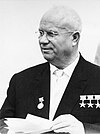Portal:Politics/Selected biography/6
Nikita Khrushchev (1894–1971) led the Soviet Union during the Cold War. He served as First Secretary of the Communist Party of the Soviet Union from 1953 to 1964, and as Chairman of the Council of Ministers, or Premier, from 1958 to 1964. Khrushchev was responsible for the partial de-Stalinization of the Soviet Union, for backing the progress of the world's early space program, and for several relatively liberal reforms in areas of domestic policy. Khrushchev was born in the Russian village of Kalinovka in 1894. With the help of Lazar Kaganovich, he worked his way up the Soviet hierarchy. He supported Stalin's purges, and approved thousands of arrests. Stalin's political heirs fought for power after his death in 1953, a struggle in which Khrushchev, after several years, emerged triumphant. On February 25, 1956, at the Twentieth Party Congress, he delivered the "Secret Speech", vilifying Stalin and ushering in a less repressive era in the Soviet Union. Hoping eventually to rely on missiles for national defense, Khrushchev ordered major cuts in conventional forces. Despite the cuts, Khrushchev's rule saw the tensest years of the Cold War, culminating in the Cuban Missile Crisis.

